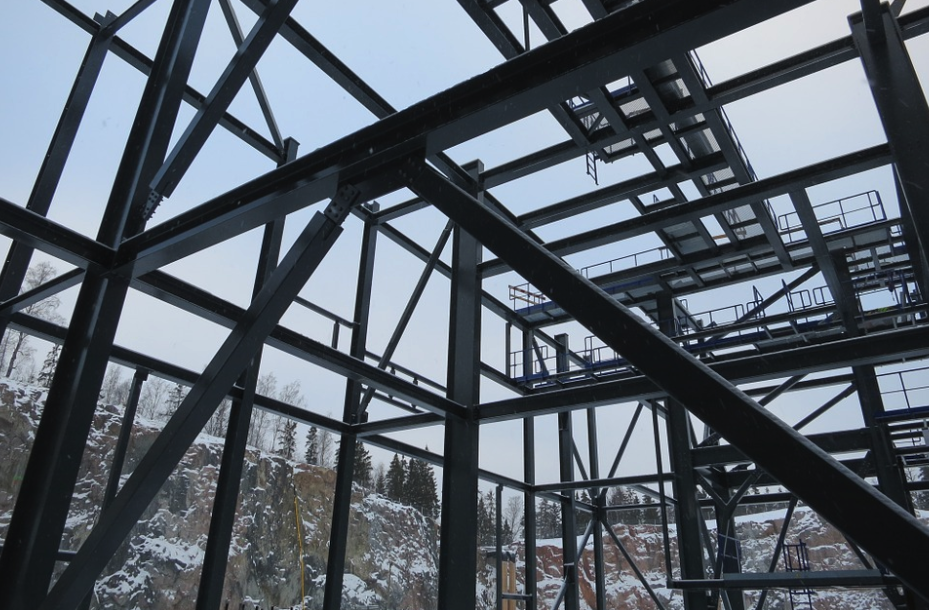
3 Problems with Steel Frame Construction and Why ICF is a Better Alternative

Fox Blocks insulated concrete form (ICF) construction creates fire-resistant, durable, and energy-efficient buildings - all features lacking in steel frame construction.
Three Problems with Steel Frame Construction

For more than 100 years, builders and architects have commonly used steel frame construction, particularly in commercial wall systems. However, three problems with steel frame construction that affect the safety, efficiency, and durability of the structures they create.
1. Fire Reduces the Strength of Steel
While steel is incombustible, its strength lessens at high temperatures, such as during a fire, making the steel frames susceptible to buckling and even collapse. In addition, because steel is an active conductor of heat, it will ignite materials it comes in contact with, which causes fires to rapidly spread to other sections of a building.
That is why steel structures often require additional fireproofing measures, along with sprinkler systems, as defined by the building-code requirements. To protect the steel from heat, contractors may enclose the steel structures in gypsum block, masonry block, gypsum board, and clay tile; however, these processes are expensive and typically require additional maintenance.
2. Steel is Prone to Corrosion
Steel is not durable because it is prone to corrosion, especially when exposed to outdoor elements. Corrosion is a result of electrochemical oxidation; when steel reacts with oxygen, it produces metal oxide or rust.
A barrier between the steel structure and the atmosphere is required to protect the structure from corrosion. Several methods to protect steel frames from corrosion include coal tar coatings, dry abrasive blasting, water blasting, paint, and substituting steel with corrosion-resistant alloys. These and other corrosion-protection methods are often expensive and are restricted by accessibility, location, and time.
3. Steel Framed Construction is Not Energy Efficient
When compared to most other framing products, steel framing is not energy efficient. In fact, wood has nearly four times the thermal resistance of steel. The reason steel frame buildings are not energy efficient is due to thermal bridging. Thermal bridging permits heat to travel from the inside of the structure to the steel frame in the walls along the most conductive path. The most conductive path in a steel frame building is the steel itself. Thermal bridging not only makes a building cold and drafty, but it can create black staining on the cold portions of the walls.
To combat thermal bridging, layers of exterior insulating board and exterior EPS, XPS or Polyiso board are often needed to achieve the desired R-values. However, thermal bridging of steel frame buildings still lowers the effectiveness of cavity insulation by 55 percent.
Why Fox Blocks ICFs are a Better Alternative to Steel Frame Construction

There are several reasons why the Fox Blocks ICF wall system is a better alternative to steel frame construction. ICF wall systems are fire-resistant and energy-efficient without the addition of expensive materials that steel frame construction requires, in addition to the time required to install them. In addition Fox Blocks ICF reinforced concrete wall systems are durable and resilient for the life span of the building. The wall system is durable because they are not prone to corrosion, mold, or termites.
Fox Blocks are Fire-Resistant
- Fox Blocks provide passive fire protection that protects the building and its occupants by controlling the spread of fire and smoke. The 6-inch Fox Blocks have an ASTM E119 fire resistance rating of four hours (twice the two-hour requirement), an ASTM E84 reported values for flame speed of less than 25 and smoke development of less than 450.
Fox Blocks are Durable and Resilient
- Fox Blocks are durable because they are not prone to corrosion, mold, and termites.
- Fox Blocks wall systems are reinforced concrete that provide resiliency for high wind weather events, floods and earthquakes.
Fox Blocks are Energy-Efficient
- Fox Blocks (R-value of 23) are energy-efficient and exceed the requirements ASHRAE/ANSI 90.1 energy code. Structures built with ICF exterior walls often use 44 percent less heating energy and 32 percent less cooling energy than steel or wood-framed structures.
- The high thermal mass of Fox Blocks further contributes to a high-performing, energy-efficient building. High thermal mass substances absorb and store heat energy, which stabilizes temperature shifts within the building by minimizing the rate of heat transfer, minimizing the operating demand on HVAC equipment.
The popularity of steel frame construction, particularly in commercial buildings, began a century ago; however, it is not without problems. Steel frame construction alone is not fire-resistant, durable, or energy efficient. To achieve these features, contractors must use additional materials that are both expensive and time-consuming to apply. A better alternative to steel frame construction is Fox Blocks ICFs. Fox Blocks ICF, as a high- performance product, create a fire-resistant, durable, resilient, and energy efficient building.